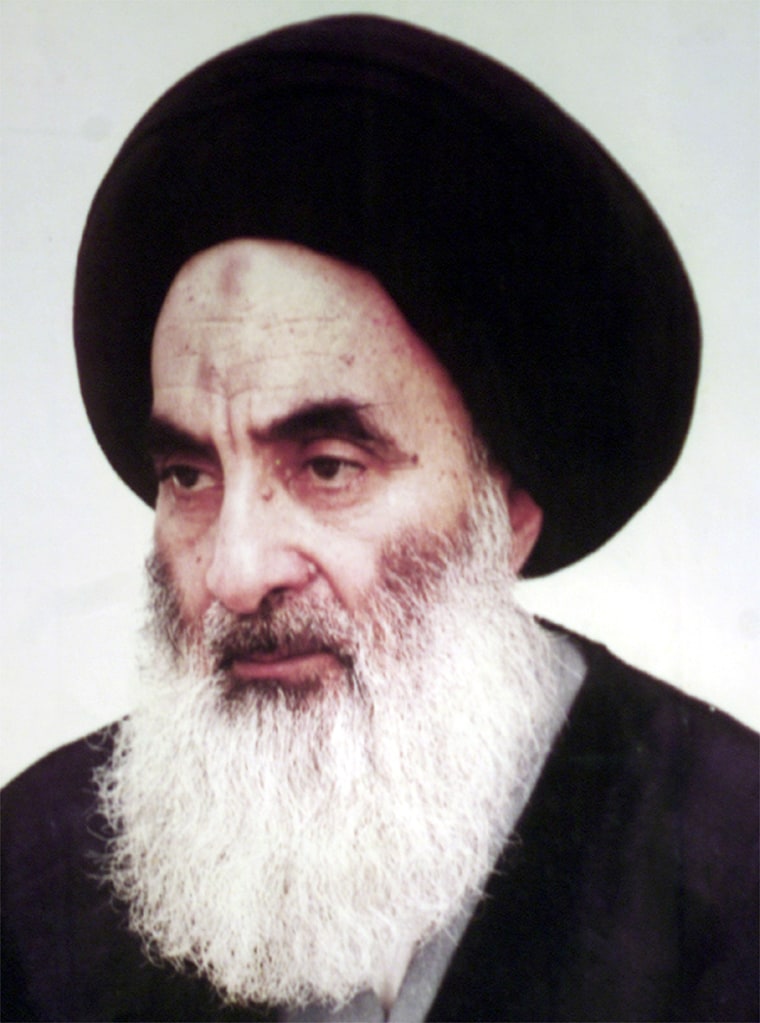From bodyguards to political allies, everyone in this Shiite holy city Friday seemed to be denying reports of an attempt on the life of Grand Ayatollah Ali al-Husseini al-Sistani — a move that would have grave implications for Iraq’s stability.
Heightening the confusion over what really happened was the elusiveness of Iraq’s most powerful figure, a recluse who has not been seen in public in a year, refuses to meet U.S. officials and makes his positions known through brief and infrequent religious edicts.
Media reports varied greatly. Some said gunmen opened fire on the elderly cleric Thursday while he greeted well-wishers. Others spoke of assailants who tried to kill al-Sistani inside his house.
Mohammed Reda, al-Sistani’s son and top aide, told Iraqi reporters through intermediaries that the reports were baseless but wouldn’t speculate on what prompted them. Abdul-Aziz al-Hakim, a Governing Council member and leader of a key Shiite political party, said reports of an assassination attempt were “fabricated” and “baseless.”
Meanwhile, a steady stream of visitors flocked Friday to the alley where al-Sistani lives to inquire about his health. “His eminence is safe and is in good health. The media reports are lies,” his bodyguards repeatedly told the crowd, who included Shiite clerics and tribal chiefs.
None of the well-wishers was permitted to see al-Sistani, but several of his students were allowed into the house on routine errands. One of them was Hassan al-Jarah, who said afterward: “If there was anything untoward, I would have known about it. It seems very much business as usual.”
U.N. visit imminent
The reports of an assassination attempt appeared as a U.N. team was expected shortly in Iraq to study whether a legislature can be elected before July 1, as al-Sistani demands. July 1 is the date set by the U.S.-led coalition and the Governing Council for ending Iraq’s occupation and for a sovereign but unelected Iraqi government to take office.
The United States and its allies on the Governing Council have asked for U.N. help as a way out of the impasse created when al-Sistani rejected U.S. proposals that the legislature be selected through regional caucuses.
The Bush administration, eager to show policy successes in Iraq during an election year, cannot afford to alienate al-Sistani because of his influence among Iraqi Shiites, believed to comprise 60 percent of Iraq’s 25 million people.
Because of his stature, an attempt on al-Sistani’s life would be a severe blow to U.S. efforts to restore law and order. The Shiite community is still reeling from the killings of two senior clerics: Ayatollah Mohammed Baqir al-Hakim, who died Aug. 29 in a bomb blast in Najaf, and Abdel-Majid al-Khoei, a cleric and son of al-Sistani’s late mentor who was hacked to death April 10 by a mob in Najaf.
Religious tensions
Those killings heightened sectarian tensions in Iraq, where many Sunni Muslims are seething over the loss of power and prestige they enjoyed under Saddam Hussein. Al-Hakim’s death was widely blamed on radical Sunnis.
Al-Sistani’s death — or even an attempt on his life — could have even greater repercussions.
“These rumors about someone trying to kill his eminence is the work of those who hate the Shiites,” said Sameer al-Janabi, who sells men’s wear near al-Sistani’s home.
The Iranian-born al-Sistani lives and receives guests and students at a modest, two-story house he rents on a small alley off Najaf’s commercial al-Rasoul — or Prophet — Street. The house is several dozen yards from the shrine of Shiism’s patron saint, Imam Ali.
Footage of the inside of the house recently released in Najaf shows no furniture. In the clip, al-Sistani squats on a carpet reading a book. Such an ascetic lifestyle has endeared him to many Shiites as they emerge from decades of oppression at the hands of a Sunni Muslim minority to assume their place as the country’s dominant political force.
Al-Sistani’s seclusion added to the confusion over the reported assassination attempt. On Thursday, U.S. officials frantically sought word from the Shiite leadership. Later, U.S. officials insisted the report was untrue.
But with al-Sistani and his aides refusing to answer questions on television or offer a detailed explanation, there will always be an element of doubt over what really happened, and whether the Shiite leadership might want to cover up an attempt to avoid inflaming sectarian passions.
